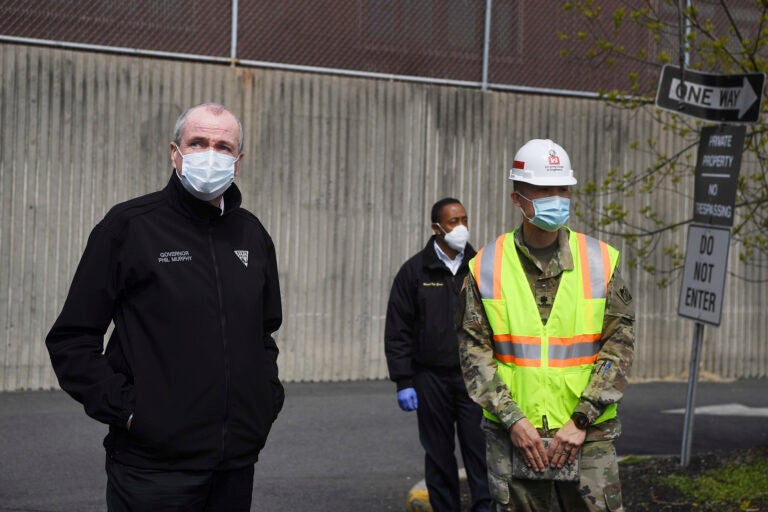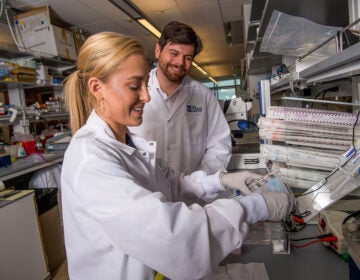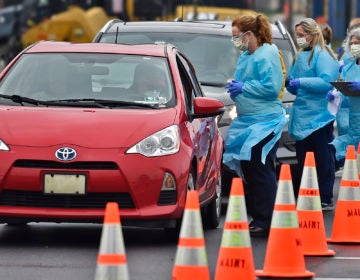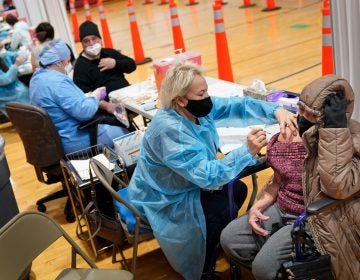Coronavirus update: Murphy furious at federal aid rules, saliva test a ‘game changer’
Also Thursday, Gov. Phil Murphy, a Democrat, again lashed out at federal leaders over cash assistance for states.

New Jersey Gov. Phil Murphy, left, visits an alternate care facility at East Orange Hospital in East Orange, N.J., amid the coronavirus pandemic, on Wednesday, April 22, 2020. (Michael Karas/The Record via AP, Pool)
Updated at 5:10 p.m.
–
Are you on the front lines of the coronavirus? Help us report on the pandemic.
New Jersey reported 4,247 new coronavirus cases Thursday, bringing the state’s total to 99,989.
Another 307 people died of complications from COVID-19, which means New Jersey has now lost a total of 5,368 residents as a result of the pandemic.
Murphy fuming over federal aid restrictions
New Jersey may be forced to return a “good chunk” of the $1.8 billion in federal aid it received as part of the CARES Act because of restrictive new guidance from the U.S. Treasury Department on how that money can be used, Murphy said Thursday.
“Treasury’s guidance renders much of this funding literally unusable,” the Democrat said, “and without additional flexibility will mean that we will likely not only not be able to use it, but we’ll have to return a good chunk of it to the federal government.”
The guidance says states can use the money for a variety of pandemic-related expenses but not to fill budget holes. Many pandemic-related expenses can be reimbursed through other federal programs, state officials said, while budget relief is what states need most to avoid deep cuts to its workforce and essential services.
“Sadly the message from Washington to our first responders and to our educators and to others on the front lines is clear: As you work tirelessly to stop this pandemic to keep people safe, our national leadership thinks you are not essential and in fact you should fear for your jobs,” Murphy said.
Governors of both parties have asked congressional leaders for $500 billion in direct cash assistance on top of the $150 billion distributed to states and localities under the CARES Act.
Senate Majority Leader Mitch McConnell’s comments Wednesday that he’d rather see states go bankrupt than have the federal government bail them out earned a rare, angry rebuke from Murphy, who called that stance “completely and utterly irresponsible.”
‘Game-changer’ saliva test could double testing capacity
A new saliva-based test developed by Rutgers University researchers will help New Jersey double its testing capacity, officials said Thursday, raising hopes for the type of widespread testing considered crucial for reopening the economy.
The test, which uses saliva instead of a swab stuck far up a person’s nose or throat, can be administered to 10,000 people a day as soon as next week, Brian Strom, chancellor of Rutgers Biomedical and Health Sciences said Thursday. The state is currently performing between 7,000 and 9,000 tests a day.
Better still, Strom said, the test returns results within 48 hours — far faster than the delay of a week or more with many swab tests. State epidemiologist Christina Tan called the saliva test a “game changer.”
Strom also said the tests are “expandable in a modular fashion,” meaning the total number of tests performed can be ramped up with more equipment and manpower. They have already been rolled out at a number of sites across the state.
Murphy has stressed repeatedly that he won’t feel comfortable lifting stay-at-home restrictions without a way to identify and isolate new coronavirus cases. Easily accessible testing for symptomatic and asymptomatic residents alike is central to that goal.
Murphy ‘open-minded’ on cash assistance for immigrants
Immigrant advocates on Thursday called on Murphy to set up a cash assistance program for undocumented residents, who are largely excluded from federal stimulus payments and the state’s unemployment insurance program.
Large numbers of immigrant families in New Jersey are now food insecure, unable to afford medicine and worried about paying rent, according to a new report from Make the Road New Jersey.
All the while, three-quarters of those surveyed for the report said they have no health insurance, even as Black and Latinx residents are being infected with COVID-19 at disproportionately high rates.
Murphy said Wednesday that a fund for immigrants is “something we want to look at.” But on Thursday, he struck a more ambivalent tone, saying he is “open-minded” about the idea but “I can’t say that I commit to it” in light of the state’s difficult financial situation.
Earlier this week, California announced a $125 million program to provide about 150,000 undocumented adults with a one-time cash benefit of $500.
Make the Road wants New Jersey to go further by providing $600 a week to workers who have lost their jobs but who are excluded from other federal or state payments. As of 2014, undocumented immigrants paid an estimated $587 million in state and local taxes in New Jersey.
N.J. unemployment payments surpass $1 billion
New Jersey has now distributed $1 billion in unemployment payments to more than half a million residents, even as workers continue to file for jobless benefits in record numbers.
Another 140,000 residents filed claims last week, bringing the total since the start of the coronavirus pandemic to 858,000. That number is higher than those receiving payments due to a backlog of applications at the state Department of Labor.
New Jersey’s total population is about 9 million.
Last week’s tally of claims is shy of the 215,000 high-water mark set two weeks prior, but it still dwarfs the low point of past economic shocks like Superstorm Sandy (46,000) and the Great Recession (25,000).
New Jersey entered the pandemic with a historically flush Unemployment Trust Fund — used to pay benefits — and still had $2.2 billion in funding as of April 17, said Labor Department spokeswoman Angela Delli-Santi.
She said the state believes that will be enough to pay benefits. But if not, states can typically borrow from the federal government to meet obligations, as happened during the Great Recession.
“Workers do not lose benefits if the balance gets too low,” Delli-Santi said. The $1 billion that New Jersey has distributed so far includes about $400 million in the federally authorized supplemental payments of $600 a week.
WHYY is your source for fact-based, in-depth journalism and information. As a nonprofit organization, we rely on financial support from readers like you. Please give today.




![CoronavirusPandemic_1024x512[1]](https://whyy.org/wp-content/uploads/2020/03/CoronavirusPandemic_1024x5121-300x150.jpg)



